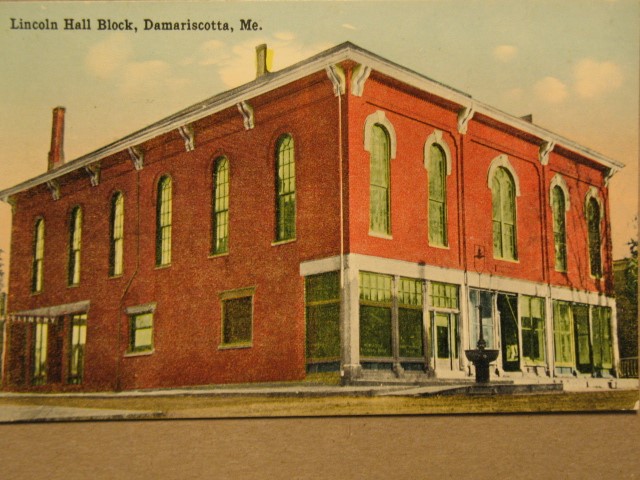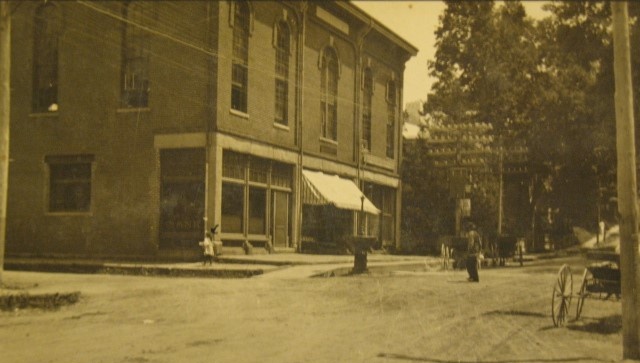 Damariscotta, Maine – 1875Lincoln HallIt was the spring of 1875 when the formal excavation of a plot of low land, tangled with alder and burdock, began. Local residents; David Chapman, Addison Austin, and Elbridge Norris, along with a few others, banded together to finance the construction of what would become an important building for the public functions of Lincoln County. The bricks (sold at just $6 per 1000 at the time) were brought up river by scows from the Page brickyard, located about a mile down in Newcastle. Through the spring and early summer the cries of the bricklayers and hod carriers were heard along with that of the carpenters, and by July 13th, 1875, the roof was on and thus was born Lincoln Hall. With a total cost of $28,500, it took a 10-month span to erect the historic building. To mark the dedication of the hall, a gala celebration was held on Wednesday, January 26, 1876, complete with a concert by the Chandler’s Military Band of Portland and followed by a grand march at 9:30 PM ending with a fancy-dress ball. Tickets for the event were sold at $5 per couple – a hefty price considering a song sheet at the time cost 30 cents, coffee went for 25 cents a pound, a decent hotel room could cost $1-2 per night, and a half-barrel of flour would only set you back $2.50. Regardless of the price, people came from near and far. The Knox-Lincoln Railroad sold round trip tickets from Bath and Rockland for those attending and guest houses were booked solid. The event, and the building itself, were a huge success and according to the late historian Harold Castner in 1963, it was “probably the most elaborate and ultra-social event ever held in the Twin Villages.” Castner went on to say that, “From that time on, it (Lincoln Hall) became the entertainment center of a vast area, due to the fact that there was nothing like it east of Portland.”
There was almost a major setback for Lincoln Hall in 1906 when the building was struck by lightning. Fortunately, the damage was minimal, and activities were able to continue. Then, in 1949, the hall was threatened again by a fire downstairs in the store of LH Pierce, but a night watchman called the Fire Department and it was contained, with little damage. Live theatrical productions have also always been a part of the life of Lincoln Hall. A notice in the Damariscotta Advertiser of March 1876 states, “The organization of a Dramatic Company with its necessary officers has been effected, and the arrangements for its first performance, are being made.” Touring companies also made it to the theater, however with less success. In that same issue of the Advertiser it states, “The Boston Dramatic Company presented, “Uncle Tom’s Cabin’ and “Rip Van Winkle,” in Lincoln Hall, March 15 and 16. Their rendition of these well know plays was good; but such performances from abroad, fail to draw crowded houses here.” In the early years of live theater productions, there were originally four backdrop scenes used for each show – painted by a Mr. Hudson of Portland. A woodland scene, a parlor, a kitchen, and a street scene served most any purpose. Two small green rooms and dressing rooms flank the stage on each side and wonderful graffiti fills the walls from practically every actor who has taken part in a production at Lincoln Hall, starting back to at least 1902 and continuing to the present day. In 1924, a Mr. Otis S. Page (the son of co-owner of the hall, Mrs. Oscar Page) made a significant change in the theater – installing permanent chairs. In addition, he sound-proofed the walls in order to accommodate moving pictures. The movie screen he inaugurated was said to be the largest movie screen in the state. Silent films were accompanied by a pianist who played appropriate music for love scenes or exciting chases. Eventually came the talkies. At some point in the late sixties to early seventies, the theater was taken over by Mr. Robert H. Reny – who kept its traditions going until the end of 1991, when the theater was sold to the Lincoln County Community Theater, a community performing arts group that had been performing around the county for two decades. On March 17, 1992, to seal the deal Mr. Reny wrote: “I just wanted to make sure that we have a complete understanding that Lincoln Theatre will continue to survive, will continue to play movies, and that you people will be using it for four or more times a year for your own productions. It will also continue to be part of the community such as Santa Claus arrivals, hopefully free movies on Saturday afternoon which can be taken care of by requests from the business and professional communities and that the operation will continue so that Damariscotta will enjoy the continuance of the Lincoln Theater as it has in the twenty odd years since we took it over.” Inside Lincoln Hall, there were originally three large kerosene chandeliers hanging across the auditorium – the original plaster rosettes from these still grace the soaring ceiling today. The beautiful silk brocade panels that you see on the walls today are the original panels that were installed during the 19th century. The original windows, having been boarded up for decades, were restored in 2017-18. |

 All through the Gay Nineties and into the early part of the 20th century, Lincoln Hall was the social center of the community. The Taniscot and Massosoit Fire Companies held their drills as well as the Grand Firemen’s Ball in the hall. It was used for graduations, dances, benefits, temperance meetings, town meetings, and conventions. Other activities in the hall consisted of dancing classes, dog shows, bell-ringing, poetry readings, road shows, minstrel shows and stock company productions – even turkey shoots! In 1903, a barbershop quartet performed in the hall singing, “You’re the Flower of my Heart” before it was actually published as the well-known “Sweet Adeline.” Around 1910, roller-skating became popular across the US, and Damariscotta was no exception. A wooden floor was laid in a circular pattern to facilitate speedier action by the skaters in the hall.
All through the Gay Nineties and into the early part of the 20th century, Lincoln Hall was the social center of the community. The Taniscot and Massosoit Fire Companies held their drills as well as the Grand Firemen’s Ball in the hall. It was used for graduations, dances, benefits, temperance meetings, town meetings, and conventions. Other activities in the hall consisted of dancing classes, dog shows, bell-ringing, poetry readings, road shows, minstrel shows and stock company productions – even turkey shoots! In 1903, a barbershop quartet performed in the hall singing, “You’re the Flower of my Heart” before it was actually published as the well-known “Sweet Adeline.” Around 1910, roller-skating became popular across the US, and Damariscotta was no exception. A wooden floor was laid in a circular pattern to facilitate speedier action by the skaters in the hall.